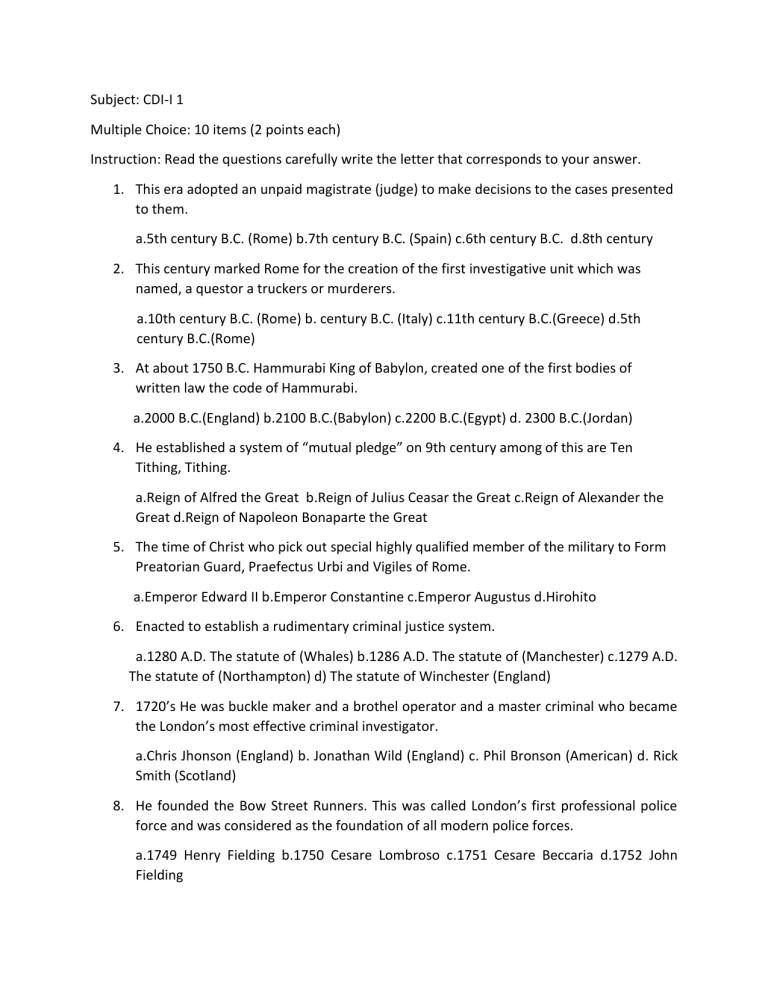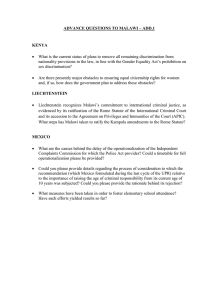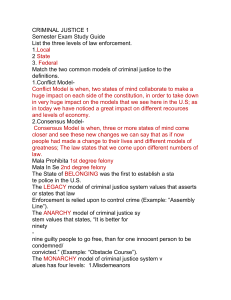
Subject: CDI-I 1 Multiple Choice: 10 items (2 points each) Instruction: Read the questions carefully write the letter that corresponds to your answer. 1. This era adopted an unpaid magistrate (judge) to make decisions to the cases presented to them. a.5th century B.C. (Rome) b.7th century B.C. (Spain) c.6th century B.C. d.8th century 2. This century marked Rome for the creation of the first investigative unit which was named, a questor a truckers or murderers. a.10th century B.C. (Rome) b. century B.C. (Italy) c.11th century B.C.(Greece) d.5th century B.C.(Rome) 3. At about 1750 B.C. Hammurabi King of Babylon, created one of the first bodies of written law the code of Hammurabi. a.2000 B.C.(England) b.2100 B.C.(Babylon) c.2200 B.C.(Egypt) d. 2300 B.C.(Jordan) 4. He established a system of “mutual pledge” on 9th century among of this are Ten Tithing, Tithing. a.Reign of Alfred the Great b.Reign of Julius Ceasar the Great c.Reign of Alexander the Great d.Reign of Napoleon Bonaparte the Great 5. The time of Christ who pick out special highly qualified member of the military to Form Preatorian Guard, Praefectus Urbi and Vigiles of Rome. a.Emperor Edward II b.Emperor Constantine c.Emperor Augustus d.Hirohito 6. Enacted to establish a rudimentary criminal justice system. a.1280 A.D. The statute of (Whales) b.1286 A.D. The statute of (Manchester) c.1279 A.D. The statute of (Northampton) d) The statute of Winchester (England) 7. 1720’s He was buckle maker and a brothel operator and a master criminal who became the London’s most effective criminal investigator. a.Chris Jhonson (England) b. Jonathan Wild (England) c. Phil Bronson (American) d. Rick Smith (Scotland) 8. He founded the Bow Street Runners. This was called London’s first professional police force and was considered as the foundation of all modern police forces. a.1749 Henry Fielding b.1750 Cesare Lombroso c.1751 Cesare Beccaria d.1752 John Fielding 9. 1753 Younger brother of Henry Fielding, he was appointed as Henry’s personal assistant in 1750. a.Albert Enstien b.Raffaelo Garofalo c.John Fielding d.Enrico Ferri 10. 1800 An English book publisher known as “The Commerce and Policing of the Rivers Thames”, who develop the marine police force. a.Ivanz Brown b.Patrick Colquhoun c.William Cook d.Gregg Hamilton Matching Type: Match column A to Column B. Write only the of your answer on the space provided before the number. 15 items (2 points each) Column A Column B _______.1 Eugene Francois A. First undercover officer in Scotland Yard. _______.2 Dr. Edmond Locard house. B. Great novelist in which through his story entitled bleak _______.3 Sir Robert Peel in investigation. C. Established a squad of ex-convicts to aid the Paris Police _______.4William Henry Talbot Force. D. British statesman who established Metropolitan Police _______.5 Charles Dickens Scientifique in 1920. E. Published L’ Enquete Criminelle el les Methods _______.6 Kate Wayne London. F. Explained his photographic process to the Royal of _______.7 Thomas Byrnes Department in Scotland Yard. G. Headed the newly organized Criminal Investigation _______.8 Jessie James Gang investigation. H. Was the first woman detective in the history of criminal _______.9 Howard Vincent fingerprints. I. An English man who published his study on classifying _______.10 Alphonse Bertillon J. Was a keen-minded individual who trained his detectives in recognizing individual criminal techniques. _______.11 Francis Galton K. Engaged in business as a barrel maker in 1846. _______.12 Paul LeLand Kirk L. The gang made the first hold-up which the beginning of the gang’s 15 year hold-up and robbery spree. _______.13 Allan Pinkerton M. Introduced the first systematic identification system based on the Anthropological measurement. _______.14 Dr. Hans Gross on blood spatter evidence. N. A chemist and forensic scientist, most known for his work _______.15 Dr. Alech John Jeffreys O. Earliest advocator of criminal investigation as a science. P. User of DNA fingerprinting and profiling.



